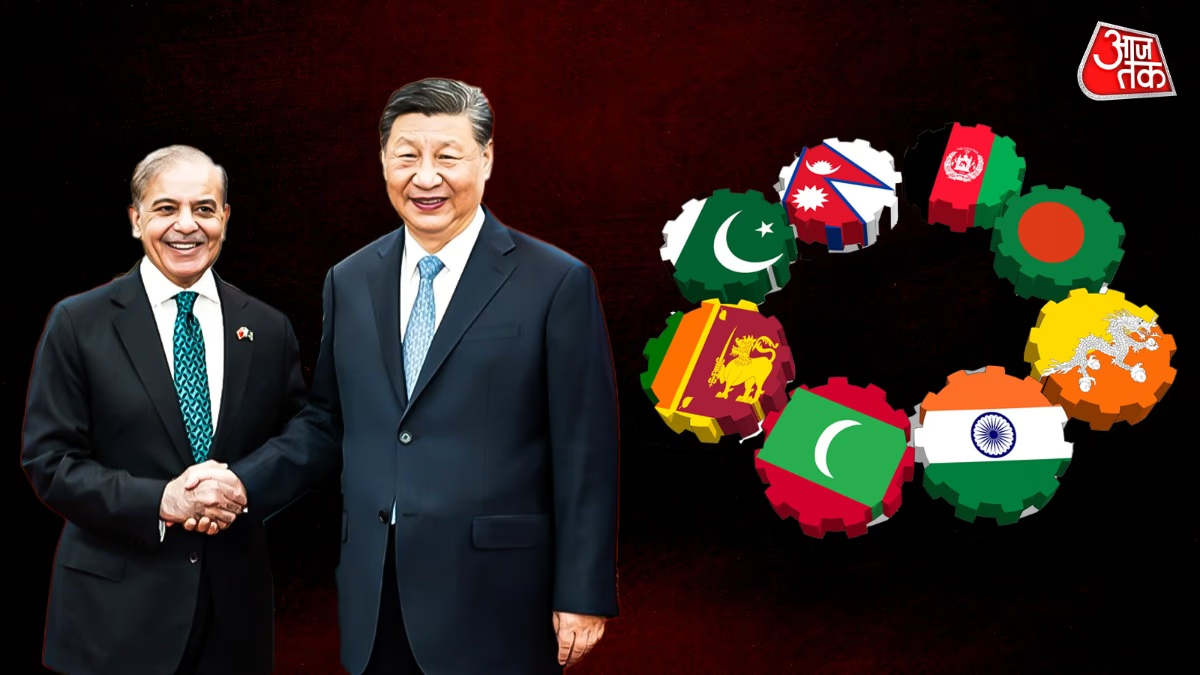China and Pakistan are preparing for a new diplomatic strategy in the political landscape of South Asia. Reports suggest that Pakistan and China are working on a proposal aimed at creating a new regional organization. This new setup could potentially dislodge the South Asian Association for Regional Cooperation (SAARC) and take its place. Behind this project lies China’s strategic vision, with Pakistan actively supporting it.
A notable meeting recently took place in China, involving representatives from Pakistan, Bangladesh, and China.
According to diplomatic sources familiar with the happenings, the Pakistani daily Express Tribune reports that dialogue between Islamabad and Beijing is now in advanced stages. Both sides agree that a new organization is essential for regional integration and connectivity.
Sources indicate that this new group could potentially replace the regional bloc SAARC, which includes India, Afghanistan, Bangladesh, Bhutan, the Maldives, Nepal, Pakistan, and Sri Lanka. China is not a SAARC member but aims to secure diplomatic and strategic influence over South Asian countries through this new entity. China maintains deep economic and strategic ties with all SAARC countries.
SAARC Meetings Absent Since 2016
Once a powerful organization in South Asia, SAARC now merely exists in name. Since the last summit in Kathmandu in 2014, its biennial summit has not occurred.
The 2016 SAARC summit was scheduled in Islamabad, but following a terrorist attack on an Indian Army camp in Uri, Jammu, and Kashmir, on September 18, India opted out, citing "prevailing circumstances."
Following India's decision, Bangladesh, Bhutan, and Afghanistan also declined to attend the Islamabad-hosted summit, forcing Pakistan to cancel the event eventually.
Meeting Among Pakistan, Bangladesh, and China
Recently, a trilateral meeting was held in Kunming, China, bringing together Pakistan, China, and Bangladesh. This gathering was reportedly part of diplomatic maneuvers to give form to this organization. The meeting aimed to invite other South Asian countries that were part of SAARC to join the new group. However, Bangladesh’s interim government dismissed any emerging alliance among Dhaka, Beijing, and Islamabad, stating the meeting was "not political."
Foreign Affairs Advisor M. Touhid Hossain stated, "We are not forming any alliance."
Sources reveal that India will also be invited to join this organization, with hopes that countries like Sri Lanka, the Maldives, and Afghanistan will join the group.
Express Tribune noted that the primary objective of the new organization is to achieve greater regional partnership through increased trade and connectivity. The paper reported that if the proposal is implemented, it could supplant SAARC, which has been dormant due to the long-standing India-Pakistan dispute.
Diplomatic Objectives in Play
India has consistently attempted to leverage SAARC for better regional cooperation and connectivity, but Pakistan often utilizes the forum for diplomatic aims.
Pakistan benefited from the SAARC Visa Exemption Scheme, which India suspended on April 22 following the Pahalgam terrorist attack.
As the largest member, India has significantly contributed to SAARC by providing substantial funding and leading initiatives like the SAARC Development Fund and the South Asian University in New Delhi to foster education and economic cooperation among member countries. However, Pakistan’s counter-strategies have often thwarted the achievement of SAARC's true objectives.
There have been numerous instances where Pakistan leveraged its SAARC veto to stall multiple beneficial ventures, particularly those aimed at trade protocols and anti-terrorism frameworks. This has hindered the organization’s effectiveness.
For instance, during the 2014 SAARC summit in Kathmandu, Pakistan vetoed the SAARC Motor Vehicles Agreement. This impeded a proposed plan for cross-border movement of passenger and cargo vehicles among member countries. Due to this obstacle by Pakistan, India, Bangladesh, Bhutan, and Nepal proceeded with the sub-regional BBIN Motor Vehicle Agreement in 2015.
Origin and Membership of SAARC
The South Asian Association for Regional Cooperation (SAARC) is a significant organization established in 1985 to promote regional cooperation and development in South Asia. Its member countries are India, Pakistan, Bangladesh, Sri Lanka, Nepal, Bhutan, the Maldives, and Afghanistan.
The goal of these nations is to work together for regional unity and prosperity. SAARC members emphasize strengthening economic, social, and cultural cooperation, with progress in sectors such as poverty alleviation, trade, education, and environmental conservation.
The organization promotes economic integration through regional trade agreements like the South Asian Free Trade Agreement (SAFTA).
However, political tensions, particularly between India and Pakistan, sometimes limit SAARC’s effectiveness.




